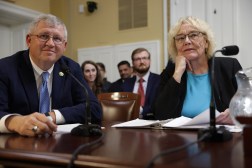Three-quarters of DIUx funding under fire in authorization bill

The final version of the annual defense authorization bill is not looking good for the Pentagon startup known as DIUx.
Research, development, test and evaluation funding for the Defense Innovation Unit Experimental will be slashed by 75 percent and operations and maintenance funding by 20 percent until Defense Secretary Ash Carter submits a report to congressional defense committees that addresses some of their concerns, according to the conference report on the 2017 National Defense Authorization Act released this week.
This is not the first time Congress has expressed misgivings with the Pentagon’s pet experiment.
And in May the House Armed Services Committee even proposed in a line item in the bill’s funding tables to zero out the $30 million requested by DOD in the president’s budget plan for fiscal 2017 for the R&D program that houses DIUx.
At the time President Barack Obama threatened a veto of the annual defense policy bill in part because of the provision.
Similar to the version of the bill that emerged from conference, the May version would have also ensured DIUx got no more than 80 percent of any funding authorized until Carter issues a report to Congress.
[Read more: Obama threatens veto of defense bill over tech outpost funding]
Carter’s report to Congress would notably need to include how DIUx is coordinating and deconflicting its work with similar activities by the intelligence community venture capital firm In-Q-Tel, defense agencies and agencies across federal government.
The instructions follow one Senate staffer making in October a comment that Congress was still unsure of how DIUx fits in to the innovation acquisition activities already spinning in other agencies, as FedScoop reported at the time.
[Read more: Senate staffer: Lawmakers still skeptical of DIUx]
“The secretary of defense is very fond of going out into the region and saying ‘this is where we’re going to find innovation, this is where we’re going to find new technologies,’ ignoring the fact that to get to San Francisco he flew over all the labs… and ignored all the great work that’s being done sort of in the defense research enterprise,” Senate Armed Services Committee professional staff member Anish Goel said then. “It leaves us thinking: does the secretary of defense actually know what’s going on inside the Department of Defense in terms of research and innovation?”
The conference report also notes that “DIUx’s customer base is not as diverse as expected,” and includes organizations with their own authorities and innovation entities.
“Although the conferees are not opposed to any organization partnering with DIUx, the conferees encourage DIUx to establish relationships with services and other Department of Defense organizations that do not have their own funding, authorities and innovation hubs,” the report reads.
The report also dings the department for not figuring out how to enable DIUx to coexist in the “innovation ecosystem with partners across the Department, finding ways to multiply the effectiveness and networking potential of DIUx by leveraging the personnel, expertise, authorities, and resources of existing successful research, development, innovation, and tech transfer mechanisms.”
The conference report also calls for Carter’s additional information to address justification for any expansion of DIUx, including into new physical locations.
“The conferees remain concerned that in the Department’s rush to try something new, defense leaders have not taken the time to determine how effective recent organizational and management changes are before seeking a rapid expansion of resources,” the report says.
Leadership at the Pentagon’s startup did in fact recently release some analysis on the organization’s effectiveness. DIUx released in October its fourth-quarter report, where it reported awarding 12 agreements totaling $36.3 million.
At the time, when asked where DIUx fits in to the Defense Department, especially given its other innovation initiatives, DIUx Managing Director Raj Shah told reporters the key distinction is that DIUx is “solely focused on leveraging commercial technologies, markets and investments.”
“We are trying to find companies and products where there’s been significant amount of investment from people outside of the department, which allows us to get the capabilities that we need cheaper and more efficiently,” Shah said. “We’re also very much focused on speed.”
He also noted: “We’ve been moving very, very fast, in startup speed over the last 140 days, and so now we’re taking a pause to be able to communicate what we’ve done and why we at the department think it’s valuable.”
[Read more: Restructured DIUx leads $36M in Q4 investments]
The report wasn’t entirely negative toward DIUX — it acknowledges the recent changes DIUx has made, presumably referring to the second iteration of DIUx that included a new organizational structure and new leadership.
“The conferees remain cautiously optimistic that the changes to the organizational structure and functions of DIUx could become important tools for the Department of Defense to engage with new and non-traditional commercial sources of innovation, as well as rapidly identify and integrate new technologies into defense systems,” the report reads.
Contact Samantha via email at samantha.ehlinger@fedscoop.com, or follow her on Twitter at @samehlinger. Subscribe to the Daily Scoop for stories like this in your inbox every morning by signing up here: fdscp.com/sign-me-on.






